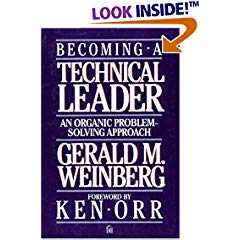More book reviews! Only two SQL books in this batch, but I try to read a few
things that aren't SQL to broaden my horizons from time to time and thought you
might see something here that would open a door for you. Too far off topic? Let
me know what you think.

The Cubicle Survival Guide by James Thompson ($11 at Amazon)
Billed as the book to teach you 'Keeping Your Cool in the Least Hospitable
Environment on Earth', it's a humorous presentation of some tips for surviving
life in a cube combined with a lot of general office etiquette suggestions. It
has some common sense content which is useful, especially for those new to
office life. Things I learned or thought more about based on the book:
- Humor can be distracting. There were times I had to skip ahead because
the humor was annoying me. I knew it was a humor approach going in of
course, but it just didn't work for me. And yes, I'd like to think I have a
sense of humor!
- It's important to remember that visitors will assess you based on your
wall hangings and other decorations, so while it's fun (and important I'd
say) to personalize your environment you should temper that with a touch of
political correctness just to avoid getting off on the wrong foot by
accident.

Becoming a Technical Leader by Gerald Weinberg ($30 from Amazon)
This is an older book, published in 1986, that I read because it was listed
in another book I read. Portions are dated, but it's an interesting book
nonetheless. I enjoyed reading it and look forward to reading some other books
from the author. It's going to be mainly of interest to experienced managers.
Beginning managers and prospective managers will be better served by reading
something with more straight forward how-to type stuff. It's worth reading.
Interesting points from the book:
- The author discusses that in order to make a leap in skill it's almost
always necessary to step back from your current approach and try something
new, and that initially the new approach will almost always be less
efficient, but over time if you've done a good assessment you'll have taken
a step forward. Zen?
- The other one was the premise is that we tend to react to situations
based on rules we've constructed for ourselves over a lifetime of
experience. The author describes a event that led him to understand a rule
he had formed early in life (age 10!) was overly broad. Rather than throw
out the rule, he decided that he needed a supplement to the rule to make it
more effective. I think this speaks to the challenge we all face as we grow
and age. Do we stick to viewpoints we developed early in life, or do we
evolve our view points as we grow and experience new things?
SQL Server 2005 DBA Street Smarts Joseph Jorden $22 from Amazon)
I bought this book based on a recommendation posted in reply to an earlier
set of book reviews. It's a certification prep book that focuses on exam 70-431.
It teaches you skills by having you step through about 60 different exercises.
It's well written and I think the exercises are useful. Microsoft exams
typically focus on very high level topics and new features, but they still
expect that you've done the tasks and will often have obscure questions that
you're only going to answer if you've done the work. I haven't taken this exam
yet, but will use this book as part of my preparation if I decide to. I've
always studied using more traditional exam books so it would be interesting to
see how this approach works out.
- If anyone has used this for exam prep I'd enjoy hearing some feedback
(without breaking the NDA please!)
Murachs's SQL Server 2005 For Developers by Bryan Syverson and Joel Murach ($33
from Amazon)
This book tries to teach the SQL skills that developers need to survive. Not
that this isn't an ADO/ADO.Net, it's about creating databases, managing
permissions, creating stored procedures, etc. It's a large book (8-1/2x11 and
700 pages) that is easy to read and is well illustrated. Most developers will
need a subset of the skills in the book, but I think it's a good reference book
that would be useful for the developer who is at the beginner to intermediate
level as far as SQL 2005. The interesting part about books is you never know
what you'll or relearn, or realize based on something being presented a
different way. Things I noted from my read:
- I don't use the SOME and ANY portions of TSQL. Not sure that I should,
but I can see that I've fallen into the rut of using a subset of the
features available. Heck, might be time to read a Celko book!
- On a similar note, I don't think I knew that the 'from' in 'delete from
sometable' was optional. I've always specified the from and think it reads a
little better. Doesn't matter in the end of course.
- I was a little disappointed with the coverage of dynamic sql. It focuses
on exec() and has no coverage of sp_executesql, the latter being important
to getting reusable plans. It also doesn't cover the risks of sql injection
or how to guard against it.


